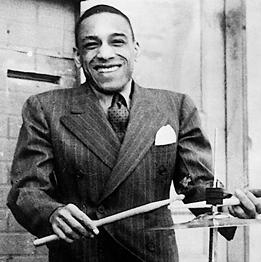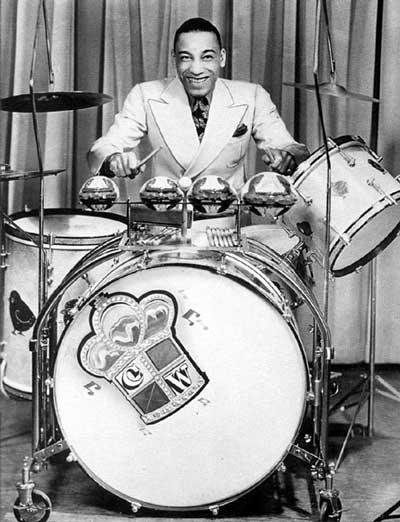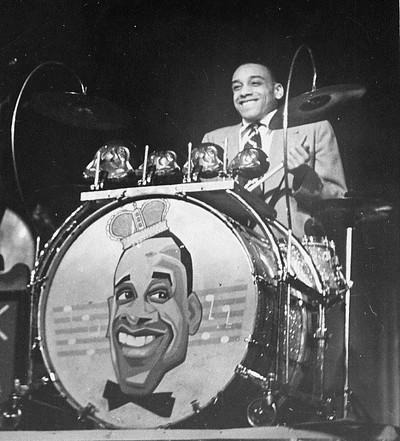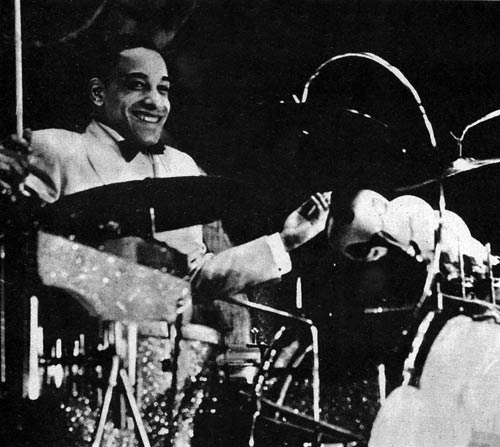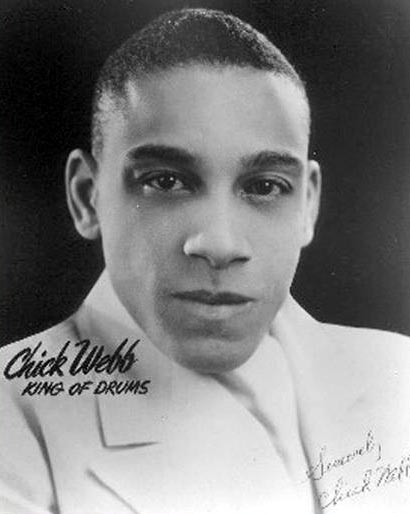Chick Webb
William Henry " Chick " Webb ( born February 10, 1905 in Baltimore, Maryland, † June 16, 1939 ) was an American drummer.
Life and work
He is a role model for all the great drummers after him, such as for Gene Krupa, Jo Jones and Buddy Rich, although he himself was only 1.30 m tall, and as a big band leader, he was the acknowledged " King of the Savoy " ( quoted. Mary Lou Williams, "king" since 1931 ), as he used to win with his orchestra band Battle with any other famous big bands in the famous Savoy Ballroom in Harlem. They were at that time under other Fletcher Henderson, Count Basie and Duke Ellington, the latter a serious competitor. Each newly arrived New York band had to be measured by switching from Charlie Buchanan with his. For the enthusiasm of his audience he made with special inserts and perfectly rehearsed new arrangements. 1931 arranged Benny Carter, Edgar Sampson from 1933 for the band. In the " Battles ", the band seems to have especially rhythmically is superior to the other bands. Chick Webb was constantly looking for new talent. In June 1934 Webb had with "I Can not Dance ( I Got Ants in My Pants ) " and the Donaldson / Kahn composition, " Stompin 'at the Savoy ", the first two of a total of 18 hits on the Billboard charts; his band were at this time among others Mario Bauza, Reunald Jones, Sandy Williams, Edgar Sampson and John Kirby at.
1934 Ella Fitzgerald was with him to stardom in his band had the hit " A- Tisket, A- Tasket ." Webb's announcements had quality entertainer, his game bribed by Drive, new hi-hat use and precision in the drum rolls, his big band combined the qualities of rhythmic black and white big bands precise. The engineering in the recordings was very limited and could only adequately record the drums, as Chick Webb was already suffering from tuberculosis of the bone, which may explain its relative obscurity compared to the other bands.
Life
Chick Webb's disease and deformity were offset by its attractive cheerful personality.
As a newspaper boy, he made only a rudimentary drums, which he then played in sequence on the sidewalks of Baltimore. His conspicuous talent with the mallets attracted the attention of Brown and Terry's Jazzola Boys to be one of the early free improvising live bands of the city and Webb joined them probably 1922.
With the older Jazzola banjo player John True Hart, with whom he played on weekends in the dance bands on cruise ships, he developed a lifelong friendship. 1924 left both men Baltimore, lured by fantastic tales of the burgeoning Harlem nightlife. In Harlem Webb had first short-lived jobs was always to be found at jam sessions, and he told long stories before Addington Major's Band Box. "Spinning the Webb " refers to his entertainer. The Band Box was a forerunner of the famous Rhythm Club. The Band Box was a place where ideas and information were exchanged. There the already successful Duke Ellington became aware of him and gave him a rejected Ellington commitment in Black Bottom Club until the end of summer 1925. By the end of Webb played with a band in the Paddock Club on the ground floor of the Earl Carroll Theatre.
In January 1927 to Webb's " Harlem Stompers " were hired to play alternately with the Savoy Bearcats and Fess Williams at the Savoy Ballroom. It made his first recordings for Brunswick. The Harlem Stompers Webb had several times put together again over the years. As Webb in the fall of his band decided to enlarge the Savoy dismissed him and he had to struggle through again with a few short-term performances.
Future stars such as Johnny Hodges, Bobby Stark, Benny Morton, Cootie Williams, Hilton Jefferson and Ward Pickett adorned all Webb's band in the late twenties, but with no permanent work, he lost it all to the more established bands like those of Fletcher Henderson and Duke Ellington. These losses inflamed Webb's ambition and desire one day to have a band that would equal this.
For different lengths of time during the next several years, Chick Webb worked on the west 125th street, then a pure white neighborhood in the Rose Dance Country. In 1929 he resumed for Brunswick under the name Jungle band that are easy to recognize by its penetrating pelvic battlefield or the wild trumpet of Ward Pickett or Elmer Williams' plaintive saxophone. It found extensive TOBA tours held by the vaudeville, all fairly disastrous ended financially. This period also coincided with the touring revue Hot Chocolates. Repeated stay at the Savoy in 1930 was underpaid because of this venue in 1930 trying to recover from financial setbacks and often reduced paid bands had to play to get out of the consequences of depression.
In March 1931 was Webb's star on dramatic than his band which replaced Fletcher Henderson at the Roseland Ballroom, a popular downtown job. Next succeeded Webb Benny Carter and Jimmy Harrison loszubekommen from Henderson's band, and in return he gave him Russell Procope and Benny Morton. The timing was perfect because Brunswick Webb brought back into the recording studio and recorded three of Carter's excellent scores ( scores) on. The good solo work on it, Louis Bacon with a trumpet solo as well as song and Jimmy Harrison with a closing solo. Elmer Williams was on tenor saxophone and piano Don Kirkpatrick. One of the pieces, Soft and Sweet, was written by Edgar Sampson, but worked out it was Carter, because the author could not arrange at that time. Carter had to sell his own piece "Blues in my heart" to the publisher Irving Mills - which was run as a co-author - for only $ 25 earnings.
Webb's euphoria was short: He lost the job at the Roseland in June 1931, Claude Hopkins, and as Harrison could not play much in that time, he left the band and went back uptown in the Savoy Ballroom for a much lower salary. Benny Carter went in August to take over the McKinney 's Cotton Pickers.
Webb was on tour again and he got until the end of 1932 again public recognition, as Louis Armstrong 's band used to make some performances for RCA. Charlie Green was now on the trombone. Armstrong had his own band disbanded before, and then went on solo tour to England.
Webb returned to the 125th street back for a job in the new Dixie Ballroom at the site of the old Rose Dance Country. He was now Tommy Ladnier had the trumpet, but the Ballroom after only three months close. Ladnier left in disgust soon the city.
In autumn, the Savoy was again active, and the owner Moe Gale decided to hire Webb's band as one of the main attractions and to open his own booking agency for urban Foreign Jobs. Webb built his band again and found his personal style by hiring altoist Edgar Sampson as a saxophonist, arranger and composer whose scores Rex Stewart's short-lived big band in the Empire Ballrom stadabwärts had let shimmer. The flexible and sought after trumpeter Reunald Jones replaced Ladnier.
Sandy Williams was a valuable trombone Star after he was a year with Fletcher Henderson, and the one-time bandleader Joe sat at the place solo piano. For Webb, the 18- year-old Taft Jordan seemed to be the opportunity for success. Jordan had worked with the former bassist of Webb's band Leon Englund in Radium Club and sang and played in a clear wide sound quite like his idol Louis Armstrong, in so far as it was possible for him at this age. Armstrong had gone in the spring overseas, where he stayed for 18 months. Jordan imitations came the Savoy audience quite well.
In Chick Webb instrumental pieces, the musicians Taft Jordan (t ) are characterized, Sandy Williams ( trombone), Edgar Sampson (as), Reunald Jones ( t), Bobby Stark ( t), Elmer Williams ( ts) from.
The Carter arrangement, eg Darktown Strutter ball stands out in his lively nature of the slightly merry swinging in medium fast pace Sampsonsarrangements from.
1934, the famous Stompin 'at the Savoy is included which Webb had co-written with Sampson.
Most of the recordings for Columbia and Okeh this time were supervised by John Hammond. These companies went bankrupt in the depression and Webb had no choice but to return to the Kapp, who now operate a record label, the British financed Deccafirma. Nearly seven months would pass after these first two Deccaaufnahmen until the next appointment in 1935 Ella Fitzgerald introduced, and their popularity will now decide on the fate of the band.
Music
Chick Webb was able to play on the bass drum rolls and had a wonderful concept in his game, such as Cozy Cole certifies him. Drive and precision, slow and fast vortices, which are hardly captured on plates, because the "single shots " just 3 ½ minutes offered, were other characteristics; he played no impropriety. Explosive Press vertebrae, of which you can still be at Art Blakey and Buddy Rich take a picture, and Bassdrumattacka as Louie Bellson and Gene Krupa were other ingredients. Ellington certified him that he was one of those musicians who are also dancers. Chick dances painted on his drums.
Webb was a fanatic precision, which is why he, after some initial head arrangements, other bands in perfectly intoned sentence work surpassed with black quality, such as Goodman's band.
CD collection
- The Complete Chick Webb & Ella Fitzgerald Decca Sessions (1934-1941) - ( Mosaic Records - 2013) - 8 CDs with Ward Pinkett, Hilton Jefferson, Louis Jordan, Don Kirkpatrick, Elmer James, Louis Bacon, Jimmy Harrison, Benny Carter, Mario Bauza, Bobby Stark, Taft Jordan, Claude Jones, Sandy Williams, Edgar Sampson, Wayman Carver, Joe Steele, John Kirby, Fernando Arbello, Teddy McRae, Bernard Addison, Mills Brothers, Garvin Bushell, George Matthews, Dick Vance, Bill Beason, Eddie Barefield, Ram Ramirez, Ulysses Livingston, Kenny Clarke

